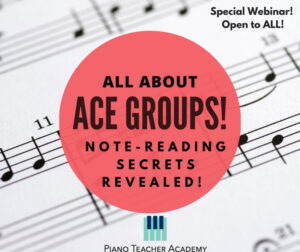Add some fun to your lessons
What can we do this year to help our students become better musicians and renew our enthusiasm for teaching? Maybe you’re getting the winter blues and are wondering what you can do to perk up lessons in January. My next several posts will discuss some New Year’s Resolutions to add some dash to lessons after the holidays.
Resolution Number One: Get off the bench
My studio was quite intense this past semester and I didn’t get around to a short game with my younger students as often as I wanted. The first resolution I’m going to make this year is to play a game or get off the bench for a few minutes with every student except my older ones.
The reason I want to do this is because most students understand theory better when they have a “manipulative” to help learn a difficult concept. Maria Montessori demonstrated years ago that children learn with hands on activities so that learning is more like play.
What are the benefits?
- Games add a fun quality to piano lessons and an element of surprise.
- They help you to get to know the student and create a good relationship between you and the student.
- Students will enjoy piano lessons more.
- Laying things out, putting things in order, and giving a student a visual picture of difficult concepts, all go a long way in teaching music theory.
- Games can teach valuable musical skills as well as being fun.
- A short game can rescue a lesson that is starting to be stressful.
The difference between an activity and a game
A game is an activity done for amusement. Most of the time we think of a game as a competitive activity such as chess or football. Some games, such as singing and clapping games, do not have a winner but are done by children for entertainment.
My students are well aware that not all activities are games and become cynical when I call an activity a “game” so my advice is not to call every activity a game if it really isn’t. I will never forget the student who suspiciously said, “You’re not one of those teachers who call something a game when it is really work and not fun, are you?”
If I ask a student to take some cards and put them in order, that is not a game to me, it is an activity. If I tell him we’re going to play Six Skipping Snowflakes and I’m going to time how long it takes him to put them in skipping order, then I will call that a game. We can keep a record and watch as he improves each week. Not all games are off the bench and not all off the bench activities are games; there is a place for both in piano lessons. Every thing you do does not have to be a game or fun, because sometimes it takes serious study to learn a concept.
The qualities of activities in a piano lesson
- Games and off the bench activities in piano lessons cannot take up too much lesson time.
- The materials have to be affordable or teacher-made so they suit the students’ needs, easy to assemble, easy to store, and easy to set up.
- The best activities are the ones you make up yourself or elaborate from ideas you get from other teachers. We should use activities that fit our teaching style and we need to be comfortable with them. Don’t worry if an activity another teacher loves does not work for you. Change it around to suit yourself or come up with something else that uses the same concept.
- Games in private lessons have to be either for the student only or with the student and teacher. Many group games and activities can be adjusted for play in private lessons.
- If it is a game, the student should succeed enough so they will want to play. If the game is too hard, it has to be modified for the ability of the student. A five year old will not play the same game as an 11 year old.
- My students love to beat me in games!
- Some students are not competitive with other students, but still may like to compete with himself to improve his score. Also, keeping a record will often help the student see that he is making progress.
- If you travel to the student’s home, think of easily transportable activities. One creative teacher in our association said he uses chalk on the student’s sidewalk to play games.
- Stop playing while the student is still interested so that he will look forward to playing it again.
If your are looking for ideas of games and activities, check out my links on the right, look at some of the great games from music publishers, or scroll through my web site.



The best reminder for New Year’s! Thanks. We have been closing the keyboard cover and playing on top. Think I’ll invest in a game AND activity board to place over the cover to signal which is which and to give us a bit more space.
Thanks for your time and energy.